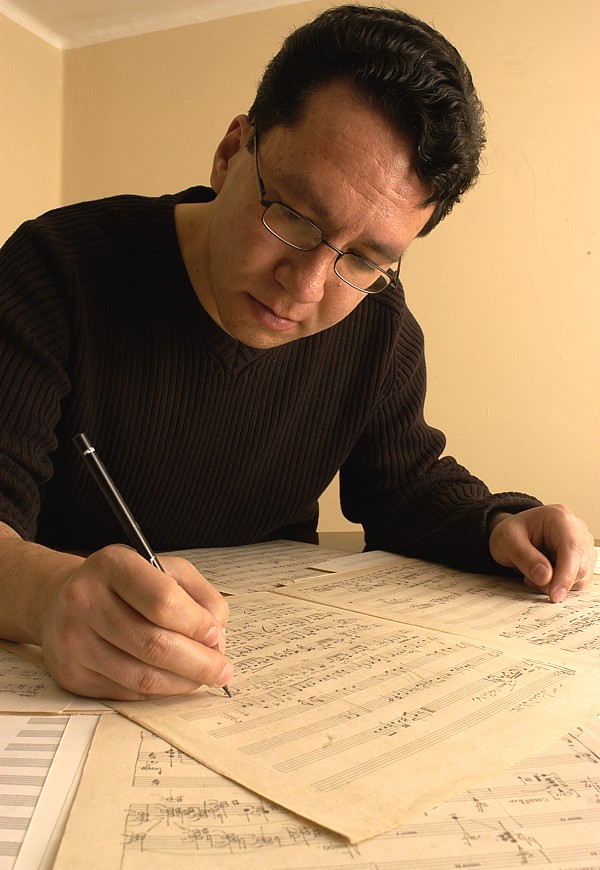Composer, teacher, and graphic artist Halas was born in La Paz, Bolivia, in 1967 to a Potosi mother and a Czech father. In 1986, he debuted as a composer at a concert in La Paz, which he shared with Alberto Villalpando and Willy Pozadas. That same year, Halas entered the Conservatorio Plurinacional de Música (COPLUMU) [Plurinational Conservatory of Music] in La Paz. However, shortly after, he traveled to the Federal Republic of Germany, where he continued his studies at the Pfälzische Musikakademie [Palatinate Music Academy] in the city of Speyer in the Rhineland Palatinate and then at the Hochschule für Musik Karlsruhe [University of Music Karlsruhe]. In 1996, he returned to Bolivia. Halas works include compositions for piano, vocal, solo instruments, chamber music, choral music, concert music, symphonic and incidental. His compositional work can be recognized according to the place and time it was generated. Halas’ juvenile work (1980 – 1986) includes an extensive collection of works, the vast majority outside the official catalog and the vast majority unpublished. Works from this time of production include the cantata El Canto de los Sepulcros [The Song for the Tombs] (1984) for soloists, mixed choir and chamber ensemble composed for the Sociedad Coral Boliviana [Bolivian Choral Society]; the Allegro Brusco Op.3 (1985); the Misa Interdicta [the Prohibited Mass] Op.6 (1987) and the melodrama for baritone and piano on the homonymous narrative by F. Kafka Report for an Academy Op.4 (1986). His European period (1987 – 1994) begins with the composition Concertino for transverse flute and string orchestra Op.8 (1988); Réquiem para la Selva Amazónica [Requiem for the Amazon Jungle] Op.10 (1990); wind quintet Op.12 (1992); and Toccata for solo cello Op.14 (1993). Halas’ Bolivian period (1995 to the present) includes works that seek inspiration from Bolivian traditions and popular music. Representative works include Cantos Líticos [Lithic Songs] Op.16 for voice and piano; Álbum para un Ratón Criollo [Album for a Creole Mouse] Op.20 (1998), El Cóndor y la Tormenta [The Condor and the Storm] Op.24 (2001), Alasita - I Book Op. 28 (2004), Jacha Flowers Homenaje Blues [Jacha Flowers Homenaje Blues] Op.29 (2004), El Entierro del Pepino [The Cucumber Burial] Op.32 (2010), Waca Concertino Op.26 (2006 - 2018) and the burlesque for solo saxophone Chuta Cholero Op.41 (2020). In addition to his solo work, Halas has also worked to create original soundtracks for films. He has worked for Oscar García on the soundtracks for movies by Jorge Sanjinés and Marcos Loayza. In 2005, he made the original music for the Fernando Vargas film “Di buen día a Papá” [Say good day to Dad]. As a music teacher, he has thrived as an academic authority in various positions. Between 2002 and 2003, he was a music professor at the Universidad Católica Boliviana San Pablo [Bolivian Catholic University San Pablo]. From 2002 to 20015, Halas served different roles in the COPLUMU; he was a member of the board of directors from 2002 to 2007, head of the Academic Unit from 2008 to 2010, executive director from 2010 to 2013, and rector from 2013 to 2015. Halas has been recognized and given several prizes as an artist and composer. In 2009, he received recognition for his 20 years of career disseminating music, artistic, and cultural events, granted by the Honorable Congress of the Republic of Bolivia. He also received recognition from the Parliamentary Brigade of the City of La Paz and the “Medalla al Mérito Cultural, Mención: Composición Musical” [Medal of Cultural Merit for Musical Composition] from the Asociación Boliviana “Pro Arte” [Bolivian Association "Pro Arte"] in 2014.

